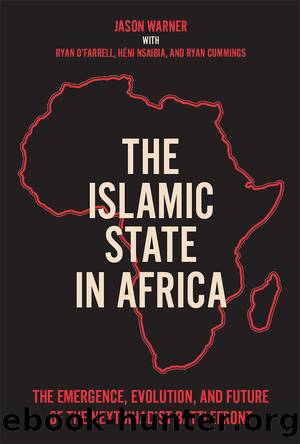The Islamic State in Africa by Jason Warner;Ryan Cummings;Hni Nsaibia;Ryan O'Farrell;

Author:Jason Warner;Ryan Cummings;Hni Nsaibia;Ryan O'Farrell;
Language: eng
Format: epub
Publisher: Oxford University Press USA
Published: 2021-11-13T00:00:00+00:00
The Near Enemy
*
Eastern Democratic Republic of Congo
2002â2014
DRCâs 2002 peace treaty with Uganda, which saw the withdrawal of Ugandan troops and the cessation of support to the ADF-NALU from Sudan and Kinshasa, forced major changes in the groupâs ideology and operations. No longer useful to regional sponsors in their battle with Uganda and severely weakened by Ugandan military pressure, the group struggled to maintain its relevance, all the while being seen still as a threat by Kampala. As the ADF-NALU became more and more integrated into Beniâs local political dynamicsâforming alliances with partially demobilized Congolese militias that had operated in the area prior to the Ugandan withdrawalâit entered successive periods of military offensives, demobilization and rebuilding, beginning in 2005, turning its focus away from Uganda and instead towards the local political and military dynamics in Beni territory and the local communities with which they were neighbors.
While the first of several military offensives against the ADF-NALU had been launched in December 2005,31 and a failed cross-border raid by the ADF-NALU in March 2006 led to significant losses,32 it was a Ugandan amnesty offered in 2007 that most empowered Mukulu as the ADF-NALUâs leader. Attempts at peace talks brokered by the United Nations between the ADF-NALU and Uganda failed, but as many as 200 combatants and much of what remained of NALU surrendered and returned to Uganda.33 With NALU effectively goneâand their demands for the recognition of the Rwenzururu kingdom being met a year later in March 2008âthe ADF-NALU effectively became merely the ADF, with Mukulu as leader.34
Having lost one of its Ugandan components, the ADF shifted toward being an amalgamation of Mukuluâs Ugandan Islamists and often press-ganged Congolese recruits and allies; already by 2007, as many as 60 percent of its fighters were Congolese, though the leadership remained primarily Ugandan.35 Despite Mukuluâs origins in Ugandaâs Salafist movement, his time as leader of the ADF in the context of repeated military offensives, demobilizations and large-scale recruitment of locals produced a period of ideological flux within the group: his previous dreams of overthrowing Museveni shifted toward more immediate goals of survival.
While the stated goal of the group was to overthrow Museveni and install an Islamist government in Uganda,36 its public statements rarely referred to Islam.37 Instead, Islamism was used as a means of maintaining discipline within the ADFâs camps,38 as many of its troops were abductees from local Congolese communities rather than radicals. In addition, Mukulu likely utilized Islamism to secure support and assistance where he could: his sonâs bail was paid by Kenyan Islamists following his 2011 arrest in Nairobi,39 and Arabic-speaking military trainers reportedly gave instruction to ADF personnel in 2013.40 It was clear, however, that whatever international ties Mukulu may have fostered, his focus remained centered on the survival of the ADF in Beniâs remote forests, with little clear evidence of aspiration to membership in the global jihadist movement.
As part of his attempts to make the ADF more resilient, Mukulu built extensive recruitment and financial networks outside eastern Congo, bolstering the
Download
This site does not store any files on its server. We only index and link to content provided by other sites. Please contact the content providers to delete copyright contents if any and email us, we'll remove relevant links or contents immediately.
The European History Highway: A Guide to Internet Resources by Dennis A. Trinkle Scott A. Merriman(498)
The Seven Wonders of the Ancient World by Michael Denis Higgins(479)
European Security in a Global Context by Thierry Tardy(472)
European Security without the Soviet Union by Stuart Croft Phil Williams(472)
The Routledge companion to Christian ethics by D. Stephen Long Rebekah L. Miles(460)
Hudud Al-'Alam 'The Regions of the World' - a Persian Geography 372 A.H. (982 AD) by V. V. Minorsky & C. E. Bosworth(401)
Gorbachev And His Generals by William C. Green(392)
Get Real with Storytime by Julie Dietzel-Glair & Marianne Crandall Follis(390)
Tibetan Studies in Comparative Perspective by Chih-yu Shih Yu-Wen Chen(387)
Governance, Growth and Global Leadership by Espen Moe(384)
Hyperculture by Byung-Chul Han(379)
CliffsNotes on Fitzgerald's The Great Gatsby by Kate Maurer(360)
The Oxford History of the World by Fernández-Armesto Felipe;(354)
How Languages Are Learned 5th Edition by Patsy M Lightbown;Nina Spada; & Nina Spada(353)
The Egyptian Economy, 1952-2000 by Khalid Ikram(353)
Oral Poetry and Narratives from Central Arabia: The Poetry of Ad-Dindan : A Bedouin Bard in Southern Najd (Studies in Arabic Literature, Vol 17) (English and Arabic Edition) by P. M. Kupershoek P. Marcel Kurpershoek(345)
The Oxford Handbook of the Incas by Sonia Alconini(335)
Europe Contested by Harold James(322)
The Hutchinson Dictionary of Ancient and Medieval Warfare by Peter Connolly John Gillingham John Lazenby(307)
